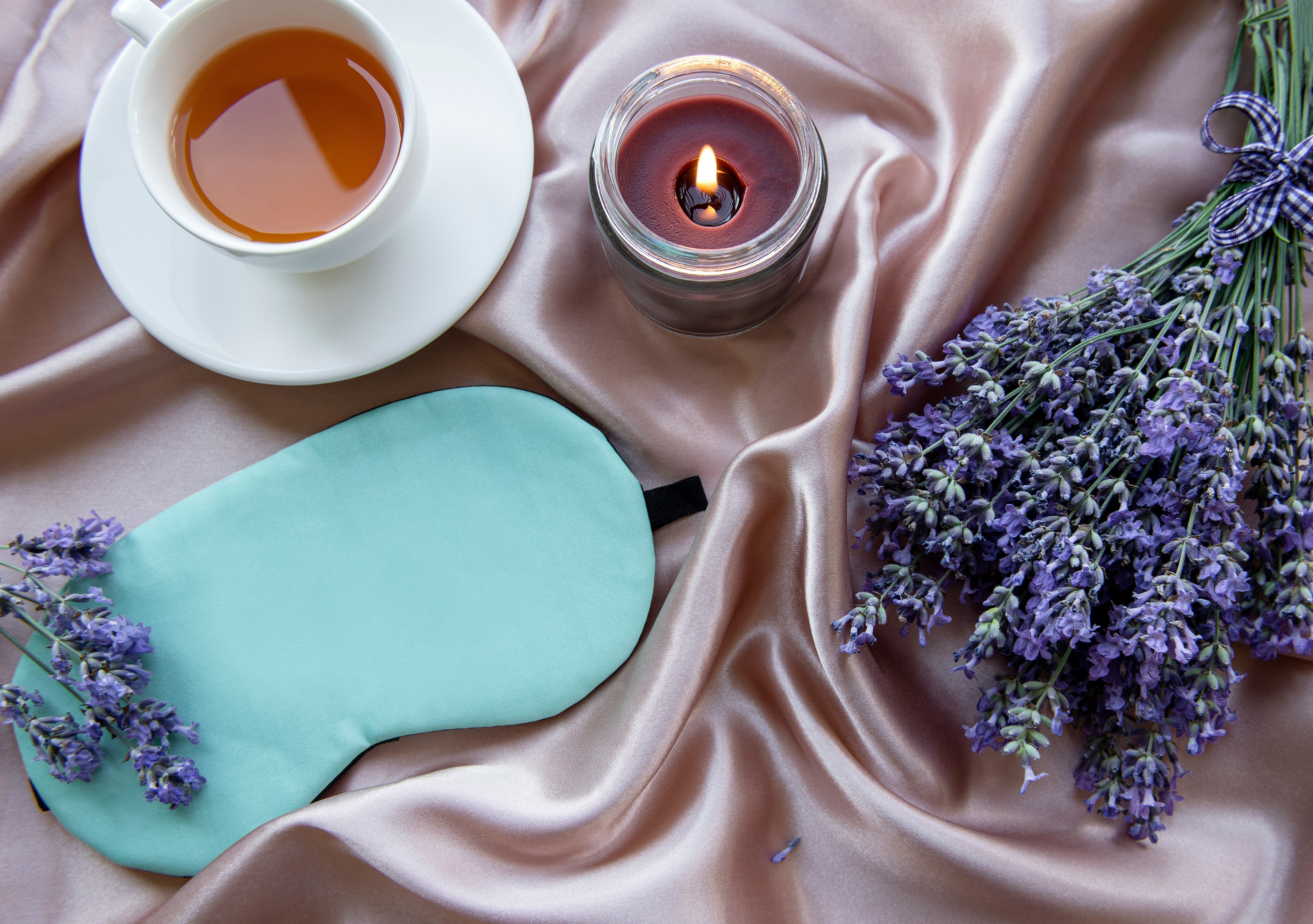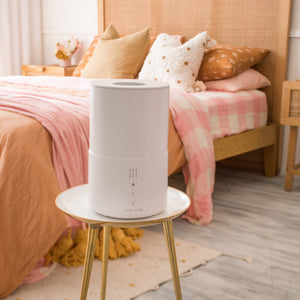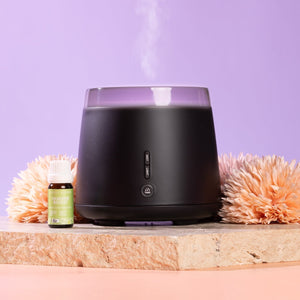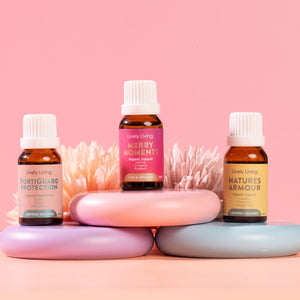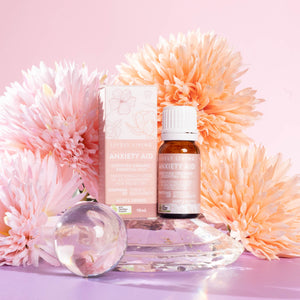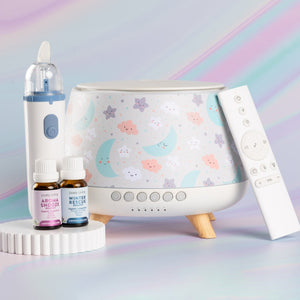Natural Aids for Overcoming Sleep Challenges: Essential Oils
Are you staring at the ceiling again, counting imaginary sheep that never seem to help? The minutes tick by, turning into hours, and all you want is some rest. A persistent sleep disturbance can be frustrating and impact your entire day.
If you are tired of being tired, you are not alone. So many of us search for effective and gentle natural aids for overcoming sleep challenges, especially when dealing with a sleep disorder. The good news is that you have options that go beyond harsh solutions.
Table of Contents:
- Why Look for Natural Sleep Support?
- Calming Herbs That Can Guide You to Sleep
- Lifestyle Habits as Natural Aids for Overcoming Sleep Challenges
- Supplements That Can Support Your Sleep
- Create a Relaxing Atmosphere with Essential Oils
- Conclusion
Why Look for Natural Sleep Support?
On those sleepless nights, it is tempting to reach for a quick fix. But those solutions can sometimes bring their own problems. Unwanted side effects like morning brain fog or even dependency can become a real issue.
Turning to a natural sleep aid is about working with your body, not against it. You are not just shutting your brain off; you are creating the right conditions for restorative sleep to happen on its own. This approach often involves improving your sleep hygiene and addressing the root cause of your sleep disturbances.
This path gives you a sense of empowerment as you build a routine that feels good and works for you.
DIffuse Essential Oils for Sleep
Diffusing essential oils for sleep is a natural and effective way to create a calming bedtime environment. Popular oils like lavender, frankincense or a sleep blend like Aroma-Snooze or Child Calming Blends from Lviely lIivng help relax the nervous system, reduce feelings of stress and anxiety, and promote deeper, more restorative rest. By using an ultrasonic diffuser, these therapeutic aromas are gently dispersed into the air, making it easier to unwind, fall asleep faster, and stay asleep longer. Beyond improving sleep quality, diffusing essential oils can also support clearer breathing, balance emotions, and enhance overall wellbeing — offering a safe, non-toxic alternative to synthetic sleep aids.
Calming Herbs That Can Guide You to Sleep
For centuries, people have used herbal medicine to promote relaxation and achieve good sleep. These natural remedies act as a gentle whisper to your nervous system. Many people find comfort and calm in a warm cup of herbal tea before bed.
Chamomile: The Gentle Sleep Inducer
You have probably seen chamomile tea on store shelves, and it is popular for a good reason. This daisy-like flower contains an antioxidant called apigenin. This compound is known for its calming effects.
Apigenin binds to specific receptors in your brain that may decrease anxiety and help you fall asleep. One study trusted source showed that chamomile extract helped improve sleep quality in older adults. A cup of warm chamomile tea is a simple, comforting ritual to start winding down for the night.
Valerian Root: An Ancient and Powerful Remedy
The history of valerian root as a sleep aid dates back to ancient Greece and Rome. People have long used it for sleep troubles and anxiety. While it has a very strong, earthy smell that some people dislike, many swear by its effects for a better night's sleep.
Scientists think it works by increasing levels of a chemical called gamma-aminobutyric acid (GABA) in the brain, which helps calm nerve activity. A systematic review of various studies suggests it can reduce sleep latency. You can find valerian root as a tea, in a tincture, or as a dietary supplement in capsule form.
While many consider valerian root safe for short-term use, it's best to consult a doctor before starting, especially if you have pre-existing health conditions. Results from any clinical trial can vary between individuals. Consistent use might be necessary to see benefits.
Lavender: More Than Just a Pretty Scent
The scent of lavender is instantly calming for many and is a cornerstone of aromatherapy. The smell itself can help slow your heart rate, lower high blood pressure, and improve mental health. Its sleep-promoting effects have been noted in numerous studies.
Using a few drops of lavender essential oil in a diffuser can fill your bedroom with a relaxing aroma. You could also try a pillow spray or add some oil to a warm bath before bed. Some research suggests that lavender can improve sleep quality, helping you wake up feeling more refreshed and supporting better brain function during the day.
Lemon Balm: The Soothing Citrus Herb
Lemon balm is part of the mint family, but it has a lovely, gentle lemon scent. It has traditionally been used to reduce stress and improve sleep. This herb is known for its calming properties that can ease a racing mind.
Information from a trusted source like the National Institutes of Health shows it may help reduce symptoms of anxiety, which often interferes with sleep. Lemon balm is often found in herbal tea blends, usually combined with other sleepy herbs like chamomile. It's a great choice if stress is what's keeping you awake at night.
Lifestyle Habits as Natural Aids for Overcoming Sleep Challenges
Sometimes, the most powerful natural sleep aids are not things you consume but are small adjustments to your daily habits. Building better sleep hygiene sends strong signals to your brain that it is time to wind down. These habits form the foundation for consistent, quality sleep.
Build Your Sleep Sanctuary
Your bedroom should be a haven for rest and relaxation. If it feels more like an office or entertainment center, sleep can become difficult. The goal is to create an environment that signals to your body it's time to fall asleep.
- Stick to a schedule: Go to bed and wake up around the same time every day, even on weekends, to regulate your sleep-wake cycle.
- Keep it cool, dark, and quiet: The ideal sleeping temperature is around 65 degrees Fahrenheit (18.3 degrees Celsius), as a drop in body temperature helps initiate sleep.
- Power down electronics: The blue light from phones, tablets, and TVs can suppress your natural melatonin levels, making it harder to feel tired. Turn them off at least an hour before you want to time sleep.
- Watch what you eat and drink: Avoid big meals, caffeine, and alcohol too close to bedtime as they can all disrupt your sleep cycle and cause sleep disturbances.
The Soothing Power of Gentle Movement
Moving your body during the day can help you sleep better at night. However, the type and timing of the exercise matter. An intense workout too close to bedtime might actually keep you awake by raising your core body temperature and heart rate.
Instead, try gentle, mindful movement in the evening. A simple yoga routine or some light stretching can release physical tension from your body.
Practice Mindful Breathing
When you cannot sleep, your mind is probably racing with thoughts about the day. Meditation and breathing exercises are amazing tools to calm that mental chatter. They work by activating your body's relaxation response and are beneficial for your overall mental health.
A simple technique to try is box breathing. Inhale for a count of four, hold for four, exhale for four, and then hold for four. Repeating this a few times can significantly calm your nervous system and prepare your mind and body for a good night's sleep.

Supplements That Can Support Your Sleep
Beyond herbs, certain minerals and hormones can play a big role in your sleep quality. It is always smart to talk with a doctor before starting any new dietary supplements. They can help you determine if a supplement is right for you, especially if you have other health conditions like kidney disease or heart disease.
Magnesium: The Original Chill Pill
Magnesium is an essential mineral involved in hundreds of processes in your body. One of its most important jobs is helping to regulate neurotransmitters that promote calm. A magnesium supplement can be very beneficial, as many people do not get enough of this mineral in their diet.
A magnesium deficiency can lead to sleep problems and other issues. The Sleep Foundation points out its role in supporting deep, restorative sleep. Proper magnesium supplementation has been linked to improved sleep, and you can find it in foods like leafy greens and nuts or take it as a supplement.
Many people prefer forms like magnesium glycinate for sleep because it's easily absorbed and less likely to cause digestive issues. Consistent use of a magnesium supplement can lead to better sleep over time. Always check with a professional to find the right dosage for you.
Melatonin: Your Body's Sleep Clock
You have probably heard of melatonin, one of the most popular natural supplements for sleep. It is a hormone your body produces naturally in response to darkness. It helps manage your sleep-wake cycle, also known as your circadian rhythm.
Taking melatonin supplements can be helpful for certain situations, like jet lag or for shift workers. The key is to use the right dose at the right time. It is best to start with a very low amount, as more is not always better and can disrupt your natural melatonin melatonin cycle.
It's important to understand that melatonin is not a sedative; it simply signals to your brain that it's nighttime. Various factors, including melatonin, work together to help you sleep natural. Discussing its use with a doctor is a good idea to ensure it's appropriate for your situation.
Tart Cherry: A Natural Melatonin Source
If you prefer a food-based approach, consider tart cherry juice. Tart cherry varieties are a natural source of melatonin and contain pro-inflammatory compounds that can promote sleep. A controlled trial has shown that drinking cherry juice can lead to improved sleep.
A glass of tart cherry juice in the evening might help increase your body's melatonin levels naturally. This can lead to longer sleep duration and better sleep quality. Look for juice without added sugar for the best health benefits.
Amino Acids for Calm
Certain amino acid compounds can also have a positive effect on sleep. L-theanine, an amino acid found in green tea, promotes relaxation without causing drowsiness. It helps quiet a busy mind, making it easier to drift off.
Another helpful amino acid is glycine. Some studies show that taking glycine before bed can help lower your core body temperature. This physiological change is a key signal that tells your body it's time for sleep, helping you fall asleep faster.
Create a Relaxing Atmosphere with Essential Oils
Your sense of smell is powerfully connected to the parts of your brain that control emotion and memory. This is why certain scents can make you feel instantly relaxed. Using essential oils, sometimes found in skin care products, can be a beautiful way to create a pre-sleep ritual.
Putting a diffuser in your bedroom thirty minutes before you plan to sleep can set a peaceful mood. It signals to your brain that the day is over and it is now time to rest. This simple act can become a powerful part of your bedtime routine.
Here are some of the best essential oils to promote sleep:
| Essential Oil | Primary Benefit |
| Lavender | Promotes relaxation and reduces anxious feelings. |
| Roman Chamomile | Has a calming effect on the mind and body. |
| Bergamot | Reduces stress and can elevate mood. |
| Sandalwood | Has a grounding effect and can quiet the mind. |
| Ylang Ylang | Can help ease tension and promote a sense of calm. |
You can even create your own sleep blend to find what works best for you. Try adding 3 drops of lavender, 2 drops of chamomile, and 1 drop of sandalwood to your diffuser. Experimenting with different scents can be a relaxing activity in itself.
Conclusion
Finding a way out of sleepless nights can feel like a complex puzzle, but you have many pieces to work with. You do not have to settle for tossing and turning and can take steps toward getting a restorative night's sleep. The journey to better sleep is a personal one.
By exploring these different natural aids for overcoming sleep challenges, you can build a nighttime routine that works for you. Combining calming herbs, supportive supplements, and healthy lifestyle habits can lead you to the deep rest you deserve. This holistic approach will ultimately benefit your overall health and well-being.









